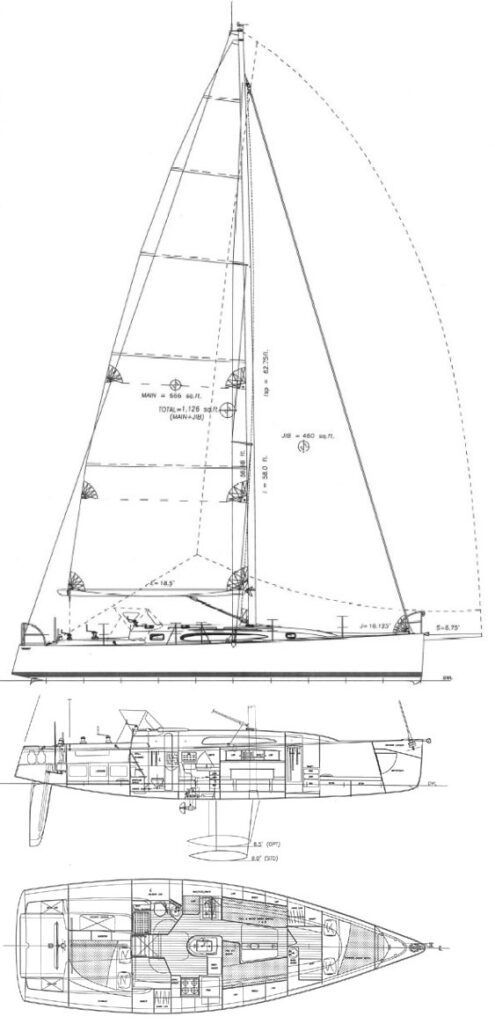The Aerodyne 43, launched in 2001 by the Finnish builder Aerodyne Yachts Ltd., represents a compelling blend of high-performance sailing and comfortable cruising amenities in a vessel just over 42 feet in length. Designed by the acclaimed naval architect Rodger Martin, this fractional sloop was conceived as a larger, more spacious sibling to the successful Aerodyne 38, aiming to cater to sailors who prioritize both exhilaration on the water and liveability below decks. It quickly established its performance credentials, winning Key West Race Week in 2002 shortly after its introduction.
Aerodyne 43 Information, Review, Specs

- Make
- Model
- Number Built
- Production Year(s)
- 2001 - ??
History and Design
The Aerodyne 43 emerged from Aerodyne Yachts' commitment to producing yachts that excel in both speed and comfort, a philosophy that has guided the company since its founding in 1997 in Hytölä, Finland. Rodger Martin, a key collaborator in Aerodyne's design journey, is credited with shaping the brand's distinct performance characteristics, including the Aerodyne 38, 43, and 47. Martin's design philosophy has consistently focused on fast-traveling yachts. For the Aerodyne 43, feedback from owners of the popular Aerodyne 38 was incorporated, leading to a design that offered significantly more volume below decks compared to its smaller predecessor. The hull and rig were highly refined and developed to enhance performance. While the provided data doesn't specify heat-cured epoxy for the 43, Aerodyne Yachts generally embraced advanced construction techniques for lighter, stiffer, and faster hulls during this era, as evidenced by its use in models like the Aerodyne 47. The Aerodyne 43 was built using composite materials, featuring a fin keel with a bulb and a spade rudder, indicative of its performance orientation.
Sailing Performance and Handling
The Aerodyne 43's design ratios underscore its identity as a spirited performer. With a sail area to displacement ratio of approximately 24.67, she is well-powered and capable of strong performance even in lighter air conditions. Her displacement to length ratio of around 124.4 positions her as a relatively light and performance-oriented boat for her size, suggesting a responsive feel at the helm. The ballast to displacement ratio of about 0.37 indicates a moderate degree of stiffness, allowing her to stand up to a good breeze without excessive heeling while still offering a comfortable motion.
Owners have reported that the Aerodyne 43 is a capable racer/cruiser, with one owner noting its suitability for both cruising and racing, from Key West to Halifax. Her fractional sloop rig, combined with a deep 8-foot max draft and efficient bulb keel, contributes to excellent upwind performance and control. The single spade rudder provides direct steering and maneuverability. The option for a shallow draft of 6.5 feet further enhances versatility, allowing access to a wider range of anchorages.
Accommodations and Layout
The Aerodyne 43 was designed with a keen eye on providing comfortable and well-appointed living spaces, offering 40% more volume below decks than the Aerodyne 38. While specific headroom figures are not available, the focus on increased interior volume suggests a spacious feel. Rodger Martin's design pays "great attention" to a beautifully designed and appointed interior. The layout typically includes a comfortable salon, a functional galley, and multiple sleeping cabins to accommodate cruising families or crew for extended voyages. Descriptions often highlight the quality of finish and materials used, consistent with Aerodyne's reputation for blending performance with comfort. The boat is equipped with a generous 80-gallon water capacity and a 35-gallon fuel capacity, catering to longer passages.
Owner's Perspectives
Owners of the Aerodyne 43 often praise its solid construction and its ability to blend racing prowess with cruising comfort. Many appreciate the boat's responsiveness and performance under sail, particularly its speed and handling characteristics. The increased interior volume over its smaller sibling, the Aerodyne 38, is a frequently mentioned strength, making it more suitable for extended stays aboard. While specific widespread weaknesses are not extensively documented in public forums, the focus on performance in a cruiser often implies that potential owners should be prepared for a boat that prioritizes sailing characteristics without necessarily sacrificing all creature comforts.
Measurements
Construction & Hull
- Construction Material
- Other
- Hull Type
- Monohull Sailboat
- Keel Type
- Bulb
- Rudder
- 1x Spade
- Ballast
- 6000 lbs (Lead)
- Displacement
- 16250 lbs
- Water Capacity
- 80 gal
- Fuel Capacity
- 35 gal
Engine
- Engine Make
- Yanmar
- Engine Model
- —
- Engine Type
- —
- Engine HP
- 40
- Engine Count
- 1
- Drive Type
- —
- Fuel Type
- Diesel
Rig & Sails
- Rig Type
- Fractional Sloop
- P (Main Luff)
- 56.66 ft
- E (Main Foot)
- 18.5 ft
- I (Foretriangle Height)
- 58 ft
- J (Foretriangle Base)
- 16.13 ft
- Forestay Length (est)
- 60.2 ft
- Main Sail Area
- 524.11 sqft
- Foretriangle Sail Area
- 467.77 sqft
- Total Sail Area (Reported)
- 1126 sqft
- Total Sail Area (Calc)
- 991.88 sqft
Dimensions
- LOA
- 42.5 ft
- LWL
- 38.8 ft
- Beam
- 14 ft
- Draft
- 8 ft
- Max Headroom
- -
- Air Draft
- -
Calculations
- Hull Speed
- 8.35 kn
- Pounds per Inch Immersion
- 1